Content
Tomato Cascade is a selective, indeterminate variety of medium early ripening. Forms leveled fruits, which are consumed fresh and used for winter harvesting. The culture is adapted to temperate climates, it is grown both in an open area and in greenhouse structures.
Breeding history
Tomato Cascade was created on the basis of the Agros company in Novosibirsk. The originator of the variety is a group of scientists led by V. G. Kachainik. After experimental cultivation and confirmation of the declared characteristics, in 2010 the variety was entered into the State Register. Recommended for cultivation in all regions. In the Urals and Siberia, tomatoes are grown in greenhouses. In the Central lane, the fruits have time to ripen in an open area.
Description of the tomato variety Cascade
Tomato Cascade is a varietal representative, not a hybrid form, therefore it gives a full-fledged planting material and calmly reacts to changes in night and day temperatures. This plant is of an indeterminate type (without limitation of the end point of growth). When the height of the stems reaches 150-180 cm, the top of the tomato is broken. Form a bush with one or two stems.
Medium early variety. The fruits begin to ripen two months after planting the seedlings in the ground. Tomatoes do not ripen at the same time, but for a long time. The fruits of the first cluster are removed in August, the last bunch ripens in October, therefore, in regions with a short summer, a greenhouse is recommended so that the ovaries are not damaged by frost.
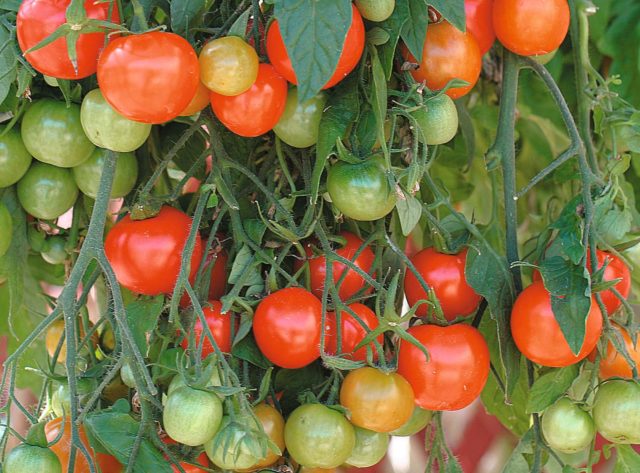
The culture received its varietal name for the branchy structure of fruit brushes
Characteristics of the tomato Cascade (pictured):
- The stalk is thick, the structure of the fibers is rigid, stiff at the base. The surface is slightly ribbed, fine pubescent, brown with a green tint.
- Leaves are few, medium-sized, lanceolate, alternately arranged. The leaf plate is slightly corrugated with wavy edges, fixed on long thick petioles, light green.
- Fruit clusters are complex, strongly branched. The length of the first bunch can reach 30 cm, subsequent ones are shorter. The density is the same for everyone. There are 5-6 fruit clusters on the stem, the first is formed after the fourth leaf.
- The flowering of the Cascade variety is abundant, the plant is self-pollinated, the flowers do not fall off, each gives an ovary.
- The root system is powerful, superficial, compact, grows 35-40 cm. The culture does not take up much space. You can place 4-5 tomatoes per 1 m2.
Description of fruits
Cascade tomatoes are small. They all have the same shape. The fruits of the first cluster do not differ in size from the last tomatoes:
- diameter within 8-10 cm, weight - 100-120 g;
- the shape is round, cylindrical, the surface is even, smooth, with a glossy sheen;
- the peel is firm, thin, bright red. The variety with a moisture deficit is prone to cracking;
- the pulp is juicy, dense, without voids;
- there are four seed chambers. Seeds are light yellow or beige, flat.
On a five-point tasting scale, the tomato Cascade received 4.8 points. The taste is sweet and sour, balanced, tomatoes are distinguished by a pronounced nightshade smell.
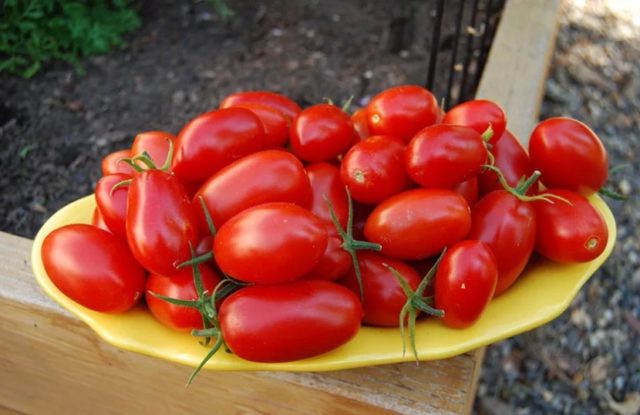
Fruits of the Cascade variety, harvested at the stage of milk ripeness, ripen safely in room conditions
Characteristics of tomato Cascade
According to the characteristics given by the copyright holder, tomato Cascade is a stress-resistant plant with good immunity to infections and pests. The variety is fruitful due to self-pollination, the length of the brushes and their density, and a long fruiting period.
The yield of tomato Cascade and what affects it
On the brush, on average, 20-25 fruits weighing 100 g are formed. The average yield of a bush with 5-6 brushes is 8-10 kg. When grown in a greenhouse, 3 plants are located per 1 m2, that is, the indicator is in the range of 24-30 kg. In an open area, the height of the plant does not exceed 150 cm, 4-5 brushes are formed on the crop, that is, the yield will be lower.
When grown in a closed way, the variety bears fruit stably. To achieve good performance, the plant is watered, fed, the fruiting brushes, stepsons and leaves are removed from the lower part of the stem. In addition to the listed activities, in an unprotected area for tomatoes, good lighting is needed, as well as compliance with crop rotation. For more than three years, tomatoes have not been planted in the same garden.
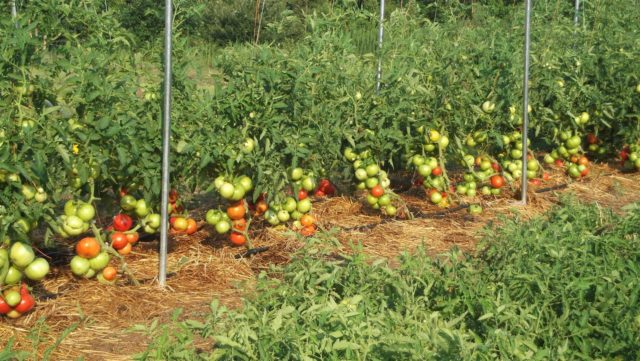
The yield is affected by prolonged precipitation, the indicator decreases due to waterlogging of the soil and a shortage of ultraviolet radiation
Disease and pest resistance
The Cascade variety has good disease and pest resistance. The development of fungal infection is influenced by high humidity in the greenhouse, excessive watering. Tomato does not respond well to stagnant water. In an open area, the neighborhood with weeds and nightshade crops, which have the same diseases and pests, is unacceptable. The main problems that arise when growing:
- late blight;
- tobacco mosaic;
- blackleg.
With a massive spread of aphids and spider mites in the area, pests can also move to tomatoes.
Scope of the fruit
Cascade is a salad variety, it is mainly consumed fresh, juice or ketchup is made. Include in vegetable salads. The small size of the fruits and their uniform shape allows you to make preparations in general for the winter. Tomatoes are pickled, salted.
The peel is thin, but elastic, it tolerates heat well, does not crack. Tomatoes have a long shelf life, do not lose their presentation within 15 days, which makes it possible to grow the variety for commercial purposes. Cascade tomatoes react calmly to transportation.
Advantages and disadvantages
The Cascade variety is one of the most productive indeterminate tomatoes, popular with vegetable growers for a number of advantages over other varieties:
- full-fledged planting material;
- high productivity;
- prolonged fruiting;
- stable immunity;
- high gastronomic score;
- aligned fruit shape;
- universal use of tomatoes;
- long shelf life;
- compact root system that allows you to plant more plants in a small area;
- the plant is open, the crown is not dense, so it takes little time to remove the leaves;
- due to long, branched, dense brushes, the plant has a decorative appearance;
- the possibility of growing by open and closed methods;
- suitable for cultivation in all regions.
Tomato Cascade has no particular drawbacks, if you do not take into account the cracking of the fruit. But this is more likely not a minus of the variety, but an incorrect agricultural technique.
Features of planting and care
Tomato varieties Cascade are propagated by self-harvested or purchased seeds (seedling method).
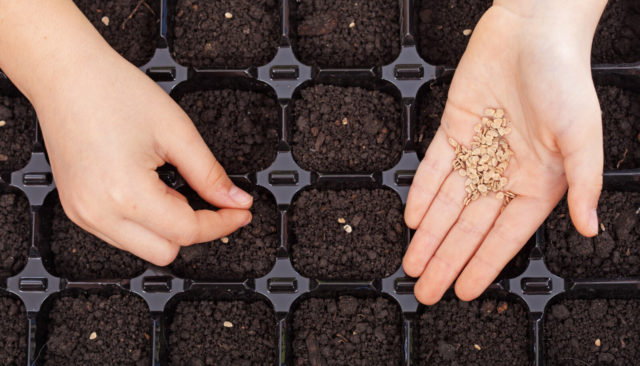
To obtain planting material, seed placement is carried out in March.
After 2 months, the tomato is planted on the site, while controlling that the seedlings are not too elongated.
Sequence of work:
- The seedling containers are filled with a fertile substrate of peat and compost.
- The seeds are pre-disinfected in a manganese solution, treated with a growth-stimulating drug.
- Furrows are made with a depth of 2 cm, maintaining an interval of 5 cm.The seeds are laid at a distance of 1 cm.
- Cover with soil, cover the container with a transparent film.
- Placed in a room with a temperature of + 20-22 0C, provide fourteen-hour lighting.
- The soil is periodically moistened.
After the sprouts appear, the film is removed. Tomatoes are fed with a nitrogen-containing agent. Water as the topsoil dries up.
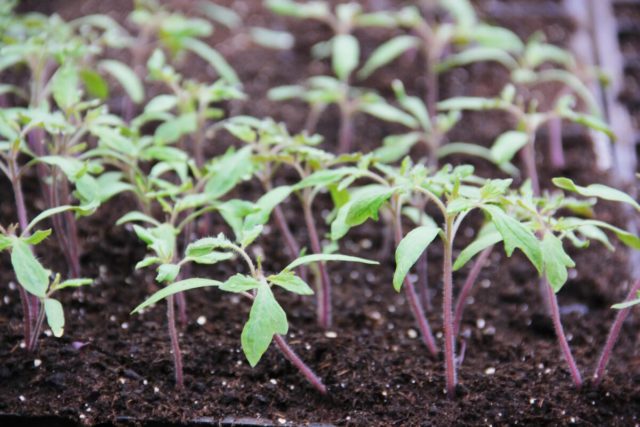
When three full-fledged leaves are formed, the tomato Cascade dive into separate containers
After the soil warms up to +17 0C and the threat of return frosts has passed, the planting material is determined in an open area. For each region, the terms will be different, but usually the work is carried out in May. Seedlings are placed in the greenhouse at the end of April or in the first decade of May.
Tomato planting algorithm:
- Compost is laid out on the garden bed and dug up, nitrophosphate is added.
- Holes are made at a distance of 50 cm, peat and ash are placed on the bottom.
- The tomato is placed at right angles to the ground and covered with soil to the lower leaves.
- Fix the support. As the tomato grows, it is tied up.
The planting is watered abundantly.
Agricultural technology of the Cascade variety:
- weed removal, soil loosening;
- top dressing every 20 days. Phosphorus, organic matter, potassium, superphosphate alternate;
- watering at the root. In the greenhouse, the procedure is carried out every other day, on the open ground they are guided by precipitation, it is necessary that the soil is always moist;
- elimination of stepchildren and brushes, pruning of the lower leaves.
Pest and disease control methods
For preventive purposes, the tomato is treated with copper sulfate during fruit setting. After 3 weeks, the procedure is repeated. If there are signs of infection, the affected parts are cut off, and the bushes are sprayed with Fitosporin or Bordeaux liquid. They get rid of aphids with "Aktara", remove anthills from the site. In the fight against spider mites, Actellik is used.
Conclusion
Tomato Cascade is a high-yielding, indeterminate variety, of medium early ripening. Suitable for growing in greenhouses and open beds. Recommended for cultivation in all regions with a temperate climate. The fruits are characterized by high nutritional value and are versatile in use. Due to their good transportability and long shelf life, tomatoes are grown commercially.
Reviews about tomato Cascade








